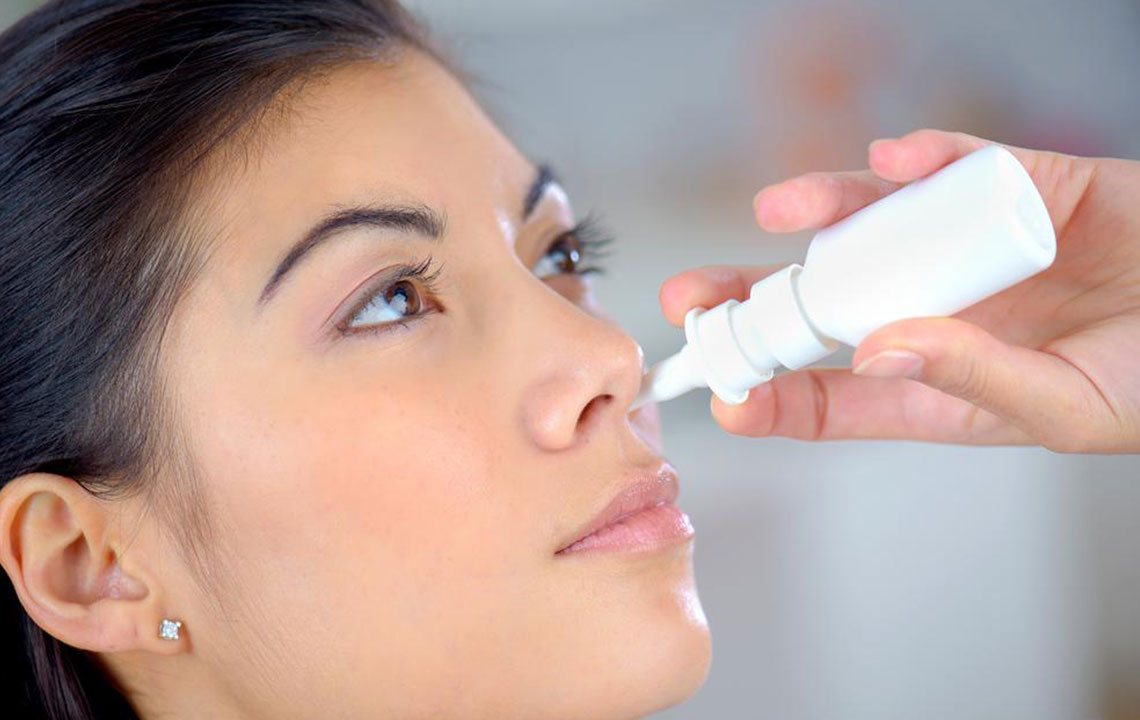Here’s How to Treat Nasal Spray Allergies
Allergy can affect any part of the human body, and the nose is no exception to this. Thankfully, there is a range of nasal sprays that can be used in case any allergy afflicts the nasal region. These nasal sprays are of different types and can act a faster pace on the allergies in comparison to a pill.
These can be bought from any drug store, but it is advisable that a doctor is consulted before buying a nasal spray since a wrong medication can give more complications and create trouble for you in the long run.

Decongestant spray
As the name indicates, decongestant spray helps in the shrinking of the blood vessels and other tissues in the nasal region. It works on tissues which cause congestion. Sinex, Afrin, and Dristan are some of the popular nasal sprays which can be used to treat these allergic conditions of the nose. However, care must be taken that these decongestant sprays are not used for a longer duration than three days. If these are used for more than three days, the risk of other infections affecting the nasal area flares up.
In normal circumstances also it is better that you consult a medical practitioner before using the decongestant spray, especially if suffering from high blood pressure or glaucoma.
Antihistamine sprays
These sprays are known to give relief from allergies like congestion, running and itchy nose, and sneezing. These sprays should only be used when prescribed by a doctor. Some popular sprays include Patanase and Astepro. These sprays cause drowsiness, but it is less in comparison to similar drowsiness experienced when antihistamine pills are taken.
Steroid nasal sprays
Sometimes nasal allergies also result in the swelling of the nose and taking normal breath becomes difficult. It is in such conditions that the use of steroid nasal sprays helps. These not only reduce the swelling in the nose but also ensure that the person suffering from a nasal allergy can breathe properly.
People suffering from dripping nose also find steroid nasal spray to be of much help. In fact, steroid nasal spray is the first of the medication referred by a doctor when any nasal allergy is noticed. However, the recovery process in the case of a steroid nasal spray is slower, and it might take some days to a few weeks before the signs of allergy are reduced.
Some of the popular steroid nasal sprays recommended for the cure of nasal allergy are Zetonna, Nasonex, and Flonase. However, it should be remembered that the use of steroid-based nasal sprays also has some side effects which might include the development of a headache, bleeding nose, cough, and sore throat.
Nasal crom
Nasal crom is another effective spray for nasal allergies. This spray stops the human body from releasing histamine. Incidentally, histamine leads to the development of allergy symptoms such as sneezing and running nose. The use of this nasal spray can also help in the case of a stuffy nose.
This nasal spray works so fast that sometimes effects are evident in a time span of 30 minutes only. However, for nasal crom to show its best results, it is recommended that its use should ideally begin five to seven days before any allergy is noticed in the nasal region. This means that once a person gets a wage idea that they might suffer from nasal allergy, the spray should be used. This also applies to people who are prone to nasal allergies as they already have a rough idea as to when their medical condition can worsen. This nasal spray is easily available at a medical store. However, people who are prone to wheezing due to asthma and sinus complications should consult a doctor before using nasal crom.
This nasal spray also has side effects such as nasal burning and sneezing.
Atrovent nasal
This nasal spray is available only on prescription and can be used to treat allergies which lead to running nose. Atrovent acts by stopping or limiting the formation of mucus. However, people who are suffering from allergies like congestion or sneezing should not use this nasal spray since it does not work effectively in such cases.
People who have glaucoma and enlarged prostate will also be not able to use this nasal spray. Atrovent nasal also has some side effects in the form of a headache, sore throat, and nasal irritation. However, it is always advised by doctors to be used by patients who suffer from mucus production as this nasal spray works very well in these allergic conditions.
There is also a range of other over the counter medications including some other nasal sprays to deal with allergies. However, it is always recommended that a registered medical practitioner should ideally be consulted before you use any of these sprays or medications. It might prove detrimental to your health, in case self-medication is done.